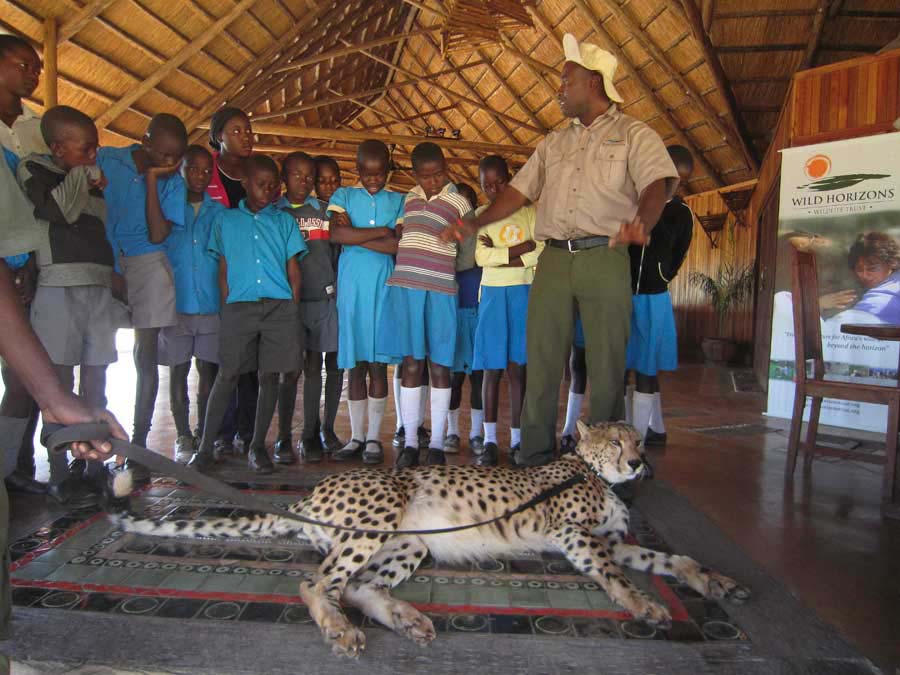In April 2010, in the Lowveld area of Zimbabwe, a cheetah gave birth to five cubs. Sadly within two days, in a cruel act of nature, she and four of her cubs were fatally attacked by a male lion, something which is common between apex predators in the wild. The sole survivor was discovered by a game scout, who witnessed the event and brought him to Norman and Penny English who became his surrogate parents. Norman had experience formerly in the Zimbabwe Parks and Wildlife Management Authority for many years. Penny was a registered nurse and having both their experience was invaluable in the attempt to keep this young cheetah alive. At two days old, Sylvester still had his umbilical cord attached and unopened eyes.
Over the following six months the hard work and devotion from the English family was rewarded but it did not come easily. Feeding was complicated and Sylvester grew faster than his bones could grow but the struggle to find a suitable formula was assisted by the many cheetah experts who passed on information. In time a dietary plan that suited Sylvester was formulated and he began to respond.
As Sylvester was never destined to become a pet, and being a specially protected animal on the endangered species list, the Zimbabwe Parks and Wildlife Management Authority have naturally been involved from the outset with Sylvester’s welfare. A plan needed to be formulated for a future permanent home for Sylvester, and in this regard the Victoria Falls Wildlife Trust became involved.
There are less than 200 cheetah estimated to exist in the wild in Zimbabwe
Despite numerous release attempts, cheetah, do not survive in the wild without experiencing the maternal care of a mother for the initial twenty two months of their lives. The human imprints of upbringing in captivity are not conducive to a wild release with rehabilitated cheetah often coming into contact with human settlements and being seen as “problem “animals.
The Sanctuary that the Trust operates from has large areas of open vleis where a cheetah can exercise naturally and build up the speed for which they are renowned. With no large predators around and the support from his three carers who exercise him extensively and assist in nurturing this orphan, Sylvester has settled in to his new life with vigour.
There are less than 200 cheetah estimated to exist in the wild in Zimbabwe, a population reduction of more than 85% according to Cheetah Conservation Project, Zimbabwe. The biggest threat to Cheetah is conflict with humans, caused by increasing human populations and the destruction of natural habitat for farming and grazing land.
Sylvester then became an ‘Ambassador for Cheetahs’, interacting with the public to raise awareness of their peril as a species and the challenges they face being on the endangered species list. Sylvester interacted with schoolchildren through our Conservation Education Programme, guests who stay at The Elephant Camp, and travel groups who visit the Elephant Wallow. Sylvester became the face for cheetah conservation here in Zimbabwe. Sadly in January 2019 Sylvester passed away, leaving behind a legacy in his name.
In recognition of Sylvester’s life-long work, some of his most ardent fans have joined together to launch Sylvester’s Legacy Fund to further the Trusts important work. This fund will provide the much-needed resources for wildlife rescue and rehabilitation, combating wildlife crime through forensic science, mitigating wildlife-human conflict and education and outreach.
Ambassador animals are important and powerful educational “tools” that provide emotional experiences and can send strong messages about conservation and wildlife. Ambassador animals help foster an appreciation for the natural world and are powerful catalysts for learning. We’ve seen time and time again how a walk with Sylvester or an interaction with Judge can provide a compelling experience that forges a personal connection with nature for our visitors and children.
There is a growing body of evidence that supports the validity of using ambassador animals to enhance delivery of cognitive messages, and the length of interaction directly impacts the emotional attachment and knowledge garnered.
Allowing visitors and school children to spend quality time with our ambassador animals lengthens the potential time for learning and overall impact, improving one’s knowledge and understanding of wildlife and wildlife conservation.
It goes without saying that the Trust recognizes the many benefits ambassador animals provide. We have a strong commitment to guarantee that the welfare, health and safety needs of the animals, handlers, and public are met and to ensure that conservation messages are received by their audience. For more information on our ambassador family, please Contact Us.

Ambassador animals help foster an appreciation for the natural world and are powerful catalysts for learning.
There are many different ways you can support the Victoria Falls Wildlife Trust.
Should you wish to make a non-monetary donation, or are travelling here and want to ‘pack for a purpose’, please see our Wishlist of items we are in need of.
Travelling to Victoria Falls?
Visit the Victoria Falls Wildlife Trust for a 1 hour tour of our High-Care Wildlife Rehabilitation Centre and Laboratory facilities.
Want to make a difference?
Knowledge is power! Sign up to receive news and other communications from Victoria Falls Wildlife Trust.
Victoria Falls Wildlife Trust
1021 Holland Road, Ext.
Victoria Falls, Zimbabwe
Office Phone: +263 782 799 006
Laboratory: +263 782 799 007
info@vicfallswildlifetrust.org
Victoria Falls Wildlife Fund
P.O Box 23182
San Diego, CA 92193
US Registered Charity No. 98-6061293
Phone: +1 619 866 5592
Victoria Falls Wildlife Trust
9 The Clock Tower, Redlers Waterside,
Dudbridge Rd, Stroud, GL5 3LH, UK
UK Registered Charity No. 1166614
Phone: +44 7476 227684
val@vicfallswildlifetrust.org